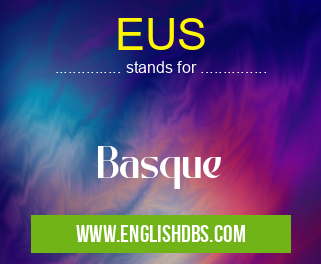What does EUS mean in LANGUAGE CODES (3 LETTERS)
EUS stands for the Basque language, which is spoken by around 1.3 million people in the western Pyrenees region of southern France and northern Spain. Euskera, as it's called in Basque, is one of Europe’s oldest living languages with an unbroken history that dates back to Roman times. It is the only surviving pre-Indo-European language spoken in Europe and it has no close relatives, so it stands quite alone among other languages in the region. Its uniqueness makes it a treasured part of the culture and identity of Basques, and its significance can be seen especially in its use as an official regional language in both France and Spain.

EUS meaning in Language Codes (3 Letters) in Regional
EUS mostly used in an acronym Language Codes (3 Letters) in Category Regional that means Basque
Shorthand: EUS,
Full Form: Basque
For more information of "Basque", see the section below.
Meaning of EUS
EUS represents the Basque language (Euskara or Euskera), which is believed to have been spoken since before Roman times and is unique to this region. It belongs to a family of languages known as Vasconic or Pre-Indo-European, meaning it did not come from any other existing language group but instead has developed independently over time. It is considered a “living fossil” because of how it has changed so little over centuries despite being surrounded by Romance languages like Spanish, French and Portuguese; there are even some words believed to date back 3,000 years! Despite its antiquity and historical importance within Europe however, many younger generations choose to speak more prevalent Romance languages due to lack of exposure or social pressure.
Use of EUS
The use of Euskera has seen a gradual decline throughout its history as most speakers are concentrated in small rural pockets rather than major cities; this trend was compounded further when Franco came into power after the Spanish Civil War (1936–39) banishing all autonomous linguistic forms apart from Spanish Castellano. However since then there have been initiatives such as regular radio broadcasts which encourage learning amongst children, bilingual education programs run by schools/universities and even television programs devoted entirely to using the language – thus helping keep its culture alive!
It still remains somewhat restricted geographically with Navarrese dialect being most common while Bizkaian & Gipuzkoan varieties are less frequently heard outside their respective regions; that said UNESESCO recognizes Basque as an official language within both France & Spain making him eligible for certain government subsidies/funding particularly those focused on cultural preservation/education support programs etc..
Essential Questions and Answers on Basque in "REGIONAL»LANGUAGES3L"
What is the Basque language?
The Basque language is a language of the Basque people, an ethnic group indigenous to parts of Spain and France. It is spoken by roughly 700,000 people in the Basque Autonomous Community, Navarre and the French Pyrenees. It is unrelated to any other known language and has no known ties to any other existing language family.
What alphabet is used for the Basque language?
The Basque language uses an orthography based on the Latin alphabet, which consists of 27 letters—the 26 standard letters plus the letter ñ.
What are some common words used in Basque?
Some common words used in Basque include etxe (house), zuri (white), beltz (black), giza (person), ilun (dark), goi (language), and urte (year).
Are there different dialects of Basque?
Yes, there are several dialects of the Basque language, including Bizkaian, Gipuzkoan, and Laba. Each has its own distinct features and characteristics.
Is it hard to learn the Basque language?
Learning a new language can be challenging regardless of which one you choose. However, with dedication and practice, you may find that learning the basics of the Basque language will come with time and effort.
Where is it spoken most often?
The majority of native speakers live in Spain’s northern region of Euskadi or in neighbouring Navarre. Some also live in southwestern France near Bayonne or on both sides of their border separating France from Spain further south near Pamplona/Iruna.
How long has it been spoken?
The origin and antiquity of the Basques date back almost as far as written history itself – likely at least 8,000 years ago – making their languages among Europe's oldest native languages still spoken today.
Final Words:
In conclusion then we can see how important Euskera – or EUS – remains for preserving both cultural identity & tradition but also economic stability within certain rural communities where speakers predominate; yet despite all this there still exists relatively low levels usage compared to more widely spoken Romance languages mainly due lack exposure/encouragement at younger age groups. However with help from organizations like UNESCO plus school curriculums dedicated teaching more about this fascinating dialect hope springs eternal that one day its long lineage will be carried forward into new generations come.
